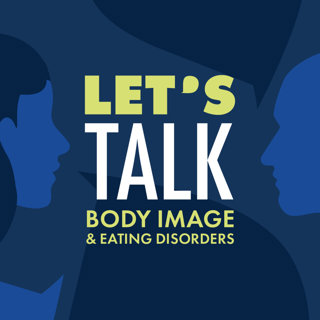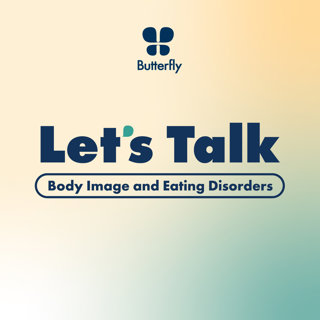
In Depth with LGBTIQA+ specialist Kai Schweizer
Kai Schweizer, who identifies as gender diverse, first joined the Butterfly podcast in 2020 for the episode Gender, Sexuality and Eating Disorders. Our host Sam spent some time getting to know how Kai’s emerging gender identity at an all-girls secondary school led to disordered eating behaviours. He’s now a respected specialist in LGBTIQA+ issues, including this community’s experience of eating disorders."We know that treating your discomfort with your body, your dysphoria, or your incongruence through disordered eating doesn't solve the problem you're experiencing," he says. "It doesn't reduce the distress that you’re feeling."While Kai's teenage years were a struggle, he found a path to recovery. "It was amazing how quickly, upon starting to feel more congruent in the body I was living in, that it became more comfortable to nourish and care about it," he says. "It is really easy to not care for the body you live in when it doesn't feel permanent. As my body became more of a home for me, it became more important to take better care of myself."Today, Kai’s a sexologist and researcher focused on trans and gender-diverse health. Two in three trans young people have engaged in disordered eating behaviours, and Australia needs safer treatment options for the LGBTIQA+ community. In particular, Kai calls for more understanding that transitioning can play a key role in recovery.For support for body image issues or eating disorders go to butterfly.org.au or call 1800 33 4673 (1800 ED HOPE).If you are experiencing concerns around your gender or sexuality, you can reach out to QLife, qlife.org.au or call 1800 184 527.OR LGBIQ+ Health Australia at lgbtiqhealth.org.auSee omnystudio.com/listener for privacy information.
15 Mars 202217min

Addressing risks of narrow body and beauty ideals in the media
It’s no secret we’ve been fed overly narrow beauty and body standards through advertising and the media for as long as both have been around. What’s less talked about are the consequences: Constant exposure to idealised bodies promotes body dissatisfaction, poor self-esteem and can trigger serious and life-threatening eating disorders."We’ve grown up with it," says veteran of the magazine industry and founder of , Mia Freedman. Not only are most models and celebrities “tall, white, skinny, exceptionally beautiful, flawless, and Anglo Saxon but they’re also airbrushed."MamamiaThe often-toxic media industry is not only dangerous for consumers but also for the people who work in them.Journalist Shelly Horton says, "I was out on the red carpet, at all of the movie premieres, interviewing stars, all that stuff when one day my boss pulled me aside and said, “Shelly, we've decided that you're probably more valuable to us behind the scenes." When she asked why, the answer was, “You’re too fat for TV."Fashion reporter Melissa Hoyer takes us to place where the media and fashion collide, often with devastating consequences. Butterfly's Communications Manager Alex Cowen talks about her work to educate journalists and advertising creatives to help them understand how a narrow view of beauty can cause real harm. And Elizabeth Paton, Project Lead of the Mindframe National Guidelines, talks about how these were developed for safe and accurate media portrayal and reporting of mental ill-health, including for eating disorders.To find our guests, here are the best places to start:Mia Freedman - Instagram @miafreedmanShelly Horton - https://shellshockedmedia.comMelissa Hoyer - https://melissahoyer.com/Alex Cowen - Butterfly Foundation WebsiteElizabeth Paton - Mindframe websiteSee omnystudio.com/listener for privacy information.
1 Mars 202229min

In Depth with eSafety Educator Cara Webber
The content we consume online can have been found time and time again to be a huge driver of body image issues. According to extensive research young people are particularly at risk. Social media, in particular, is packed with unrealistic images and ideals. These platforms can be an incubator for mental illness - including eating disorders. This has been a growing problem for years and it's why the Australian Government created the Office of the eSafety Commissioner. It's effectively the country's online watchdog.Cara Webber is the senior education officer at the eSafety commission. She spends a lot of her time speaking to young people and their parents about how to have safe and positive experiences online. She is particularly interested in encouraging people to become positive influencers and take a leadership role in shaping happily and healthy digital cultures.In this episode of Let’s Talk In Depth, Cara takes host Sam Ikin through some of the measures the commission is taking to make sure kids are not developing negative body image or disordered eating patterns as a result of their social media experience.See omnystudio.com/listener for privacy information.
15 Feb 202218min

Sex, intimacy and body image
Negative body image can impact almost every aspect of your life, especially your sex life. And while fulfilling intimate relationships is a key component of general wellbeing, the shame hammered into us by societal messages about what bodies should look like is too often carried into the bedroom. It can seriously mess with our sexual experience.“Self-judgement and self-criticism make us feel low, and when we're feeling low, we don’t feel particularly sexy,” says sex and relationships therapist, Adriene Cobcroft.Sex educator and broadcaster Nat Tencic agrees. “You’re literally naked,” she says. “If you aren't comfortable in your skin, you're not going to be able to be in the moment and you're not going to be able to experience pleasure.”The good news is there are ways to improve our body image and by doing so enhance our sexual enjoyment. When Nik Mitchell learned to embrace his vulnerability and be more body kind, he opened himself up to a fulfilling sexual relationship. Bella Davis learned how to get out of her head and into her body, fully allowing herself to enjoy the moment. Dating app Bumble’s Lucille McCart’s insists that authenticity is key. "I guarantee you," she says, "No matter what type of body you have, there is someone out there that will find you completely beautiful, but we don't hear that enough."For help or support with negative body image go to butterfly.org.au or call the Butterfly Helpline on 1800 33 4673 or 1800 ED HOPE.To find out more about our guests in this episode:Bella Davis is on Instagram @isabelladavis6For Nat Tencic, start with her website https://nattencic.com/Addy Cobcroft also has a website https://www.adrienecobcroft.com/You can follow Lucille McCart on Instagram @lucillemccartNik Navy is also active on Instagram @nik.navySee omnystudio.com/listener for privacy information.
1 Feb 202224min

What is fat phobia (and why should you care)?
Fat phobia is the fear and dislike of fat or larger bodies. It’s irrational, unjust, and often expressed in damaging ways. In fact, weight stigma is associated with several negative outcomes for people in larger bodies, including decreased opportunity in employment, income, education, housing, and medical care. The mental health impacts are also well documented: increased stress, anxiety, depression, and low self-esteem – all of which are also risk factors for eating disorders. In our new episode we unpack fat phobia, hear firsthand from award-winning writers Megan and Karyn, and the wildly popular “Bodzilla”, April, about how they have experienced it. We also hear from Dr. Xochitl dela Piedad Garcia of ACU about what the research has to say about weight discrimination, and from Georgie, an ally, about how she is addressing thin privilege to support a much-needed change in perspective.See omnystudio.com/listener for privacy information.
18 Jan 202225min

In Depth with fat positive influencer Katie Parrott
Social media influencer Katie Parrott uses her online presence to normalise our view of larger bodies and to talk about fatphobia, mental health, public health, food, fashion, and anything else that comes to mind. Katie spent some time with our host, Sam Ikin, talking about her journey to body acceptance. It wasn’t always easy for Katie to shrug off the societal pressure to subscribe to the thin ideal, or to get where she is now: a joyful and powerful equal opportunity advocate for people of all shapes and sizes.For help with body image issues or eating disorders call the Butterfly helpline on 1800 ED HOPE that's 1800 33 4673 or go to https://butterfly.org.au/ for online support and resources.Follow Katie Parrott on Instagram https://www.instagram.com/katie_parrottOr check out her website https://katieparrott.wordpress.com/about/See omnystudio.com/listener for privacy information.
4 Jan 202218min

In Depth with exceptional sibling Jack Symonds
Jack Symonds never considered himself to be much of a swimmer. In fact, before deciding to swim the English Channel to raise funds for Butterfly, it was probably twelve years since he swam a single lap in a pool.Jack is the sibling of a beloved sister who battled an eating disorder for close to ten years. “They say that people don’t get eating disorders, but families do”, he says. “And in my experience, that was certainly true.” With this background, Jack was compelled to do something significant to support people with eating disorders, “Because every time someone receives proper care their life could be saved.” Jack’s swim also benefitted Black Dog Institute, an organisation that helped him when he was dealing with his own mental health issues.What’s amazing is that he started out with a modest goal to raise $10,000 but instead raised more than $275,000. Listen to him talk to Sam about why he did it, what it was like, and what he learned from this epic and life-changing experience.See omnystudio.com/listener for privacy information.
20 Dec 202124min

What does an eating disorder look like to you?
About a million Australians are going into this holiday season - which is often defined by feasting - struggling with an eating disorder. Many of those will be hiding in plain sight.They’ll be struggling but the people around them won’t have any idea because they don’t fit the stereotype. They don’t look the way people with eating disorders are supposed to look. It’s why experts say there are a significant number of people who are not being diagnosed. They may be unsure about what's going on, or they don't feel like they can ask for help because their experience feels so unusual.In this episode, we hear from AJ who developed an eating disorder at the age of 11. Being an indigenous male, he didn’t think that he could possibly have an eating disorder. “I had heard of eating disorders,” he tells us. “I thought they only happened to pretty young girls who did ballet.” As a result, he went undiagnosed and untreated for years until a thoughtful teacher intervened.June is in her 70s and has also struggled with stigma. Her ED wasn’t diagnosed she was well into her 30s, despite being there since she was 11. “The stereotype that you have to be thin to have an eating disorder is so false,” she says. “People can look very (I hate to use the word) normal, and still have an eating disorder.” She says the stigma she faced as a young woman was awful but things are improving.Social media influencer, Katie, suffered from anorexia when she was a student, but being a person in a larger body, nobody questioned her unhealthy behaviours. “I’ve talked to people about having an eating disorder and people assume it was binge eating disorder and I’m like ‘no, I was fully starving myself’.” She says she didn’t think she had an ED either. “If you wrote down the things I was doing without knowing what I look like, anybody would say that was an eating disorder.Researcher and author of Butterfly’s Community Insights Report, Claire Lister, says the data shows people who suffer from eating disorders are just as likely to hold unhelpful beliefs about them. Michelle Blanchard from the National Mental Health Commission says people are beginning to understand the complexity of eating disorders but the myths and stereotypes are still a barrier for many who live with them. The question is how do we help them come out?See omnystudio.com/listener for privacy information.
14 Dec 202125min






















